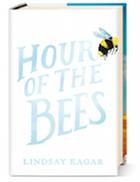
Twelve-year-old Carol is annoyed. Her friends will be whooping it up poolside in Albuquerque their last summer before junior high, and she's stuck with her family, headed for a remote, 200-acre sheep ranch in the middle of the hot New Mexico desert to visit her father's father, the Mexican American grandfather she's never met. It's a "summer-vacation-turned desert-hostage situation." To make matters worse, the purpose for their family trip is not for the three kids to finally be introduced to Grandpa Serge, it's to pack up the old man's house, sell the ranch and move him--against his will--into a home for dementia patients.
The ranch is bleaker than Carol imagined: "Across the rose-colored land, a run-down rambler sits in a browned pasture, its roof sagging, the porch beams warped with age." There's nothing for miles but coyotes, scorpions and fire ants. The dozen or so remaining sheep are skin and bones. And then there's Carol's grandfather, with his watery blue eyes "like faded jeans" and mottled face, who insists on calling her "Caro-leeen-a," and who can't understand why she "spits" on her Mexican roots by calling herself Carol. Even the ancient dog, Inés--despite what Grandpa says, she can't be the same dog Carol's dad grew up with--looks like a frizzled zombie.
It's a challenging, back-breaking summer. Working to get the ranch fixed up to sell while babysitting her one-year-old brother, Lu, in dangerous terrain and keeping an eye on Grandpa Serge isn't easy for Carol. Her 17-year-old half sister, Alta, isn't much help either, with her refusal to get dirty and her all-over-the-map moods: "She has the same heart-melting smile as Mom--only Alta's has fangs," notes Carol. Alta comes and goes as she pleases, reigns as "queen of the monosyllable" on her "Moody Alta" days, and wears platform wedges on the ranch when she should be wearing "snake-stomping boots."
As the days go on, however, the summer starts to feel less like a hostage situation for Carol. She loves the desert's strange beauty, the open sky, the stars, her mother's seemingly newfound flair for Mexican cuisine... and her grumpy grandfather starts to grow on her. Grandpa Serge tells her the wildest stories from the wicker chair on his porch roost, and every story begins with the same tree. Before long, Carol is begging him for the next installments.
Once upon a time, there was a tree, bigger around than three men could hug. Its leaves were emerald green, the bark black. The tree's branches dipped and curved like a lazy river, and its roots kissed the shore of a green-glass lake.
According to Grandpa Serge, the tree blossomed year-round with beautiful white flowers, "spicing the dry desert air with their honey-vanilla fragrance," and the bees kept it alive. For centuries, no one in the village ever died, and the tree healed the villagers' injuries. There was a boy named Sergio who loved a girl named Rosa, a girl who had "a wanderlust like a fever" and wanted to see the corners of the earth. Sergio was fearful, and wanted to stay close to home like all the other villagers always had. But since he loved Rosa, he had to accept her wandering.
Little by little, Carol starts to feel like her grandfather's stories may not be as far-fetched as they seem. For instance, Grandpa says bees used to follow Rosa around... and they follow Carol around, too. Grandpa says, "If you see any more bees, chiquita, tell me. The bees will bring back the rain." But Carol doesn't dare tell him about the bees she sees because of her family mantra: "Our number-one goal this summer is... not to upset Grandpa." Is it crazy for her to think the bees really might bring rain to the dying, drought-stricken land?
Debut author Lindsay Eagar skillfully blends a realistic, contemporary family drama with this dreamy, fairy-tale world of the green-glass lake that Grandpa Serge reveals to Carol through his enchanting stories. Will Carol's father make peace with Grandpa Serge after his 12-year-absence, and what drove them apart, anyway? Why won't anyone talk about Grandma Rosa, who died the same day Carol was born? Why is Alta so stubbornly clinging to her "half sister" status, a self-imposed black sheep? And what will happen to Grandpa if he has to leave the place he loves the most?
After a few scary and suspenseful moments on the ranch--and swirling questions about time, memory, legacy, belonging, fear and courage, life and death--Carol's friends' texts about pools and parties lose their urgency for her. By summer's end, Carol has fallen in love with her magnetic Grandpa Serge and his rose-colored sheep ranch, and she feels connected to her heritage to an extent she never could have imagined. Grandpa tells his granddaughter, "You belong with the stars, like [Rosa] did," and he makes her feel it's true.
Hypnotic and hopeful, Hour of the Bees pulls readers right into the heart of the hot New Mexico desert and its promise of magic. The importance of living without fear, embracing one's roots and finding our own families loom large in this debut novel that hums with life and love. --Karin Snelson, children's & YA editor, Shelf Awareness

